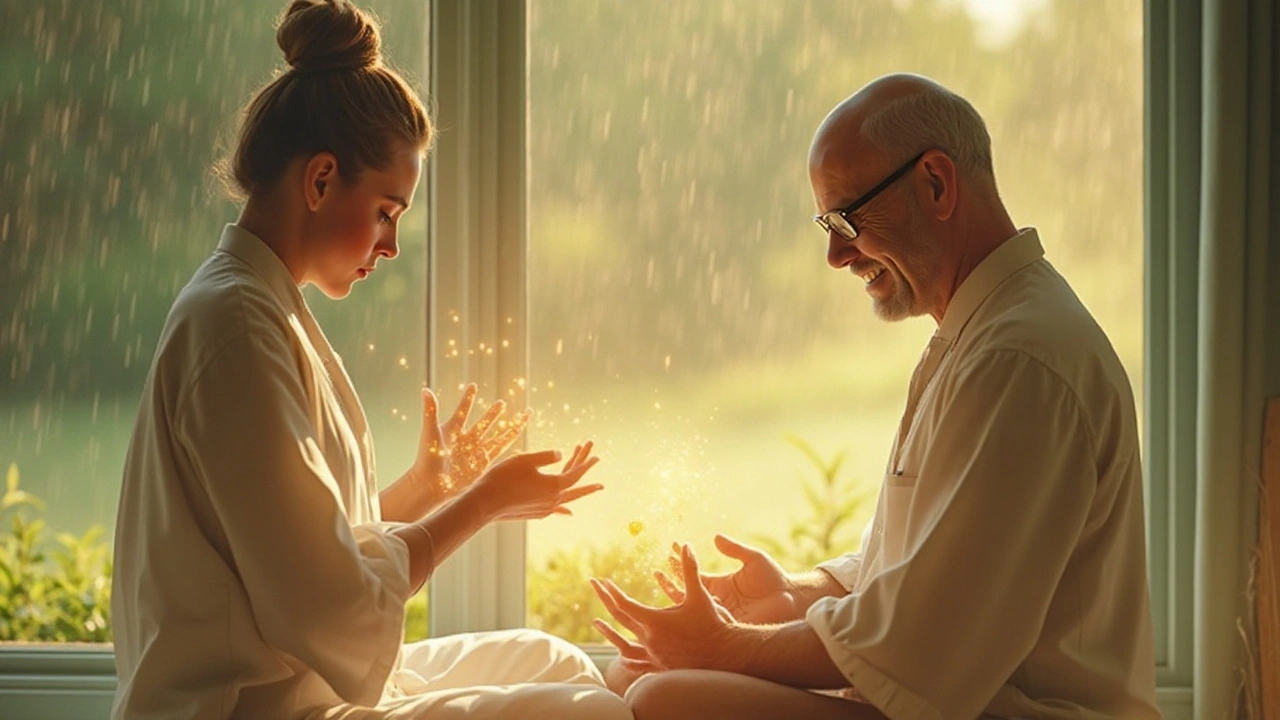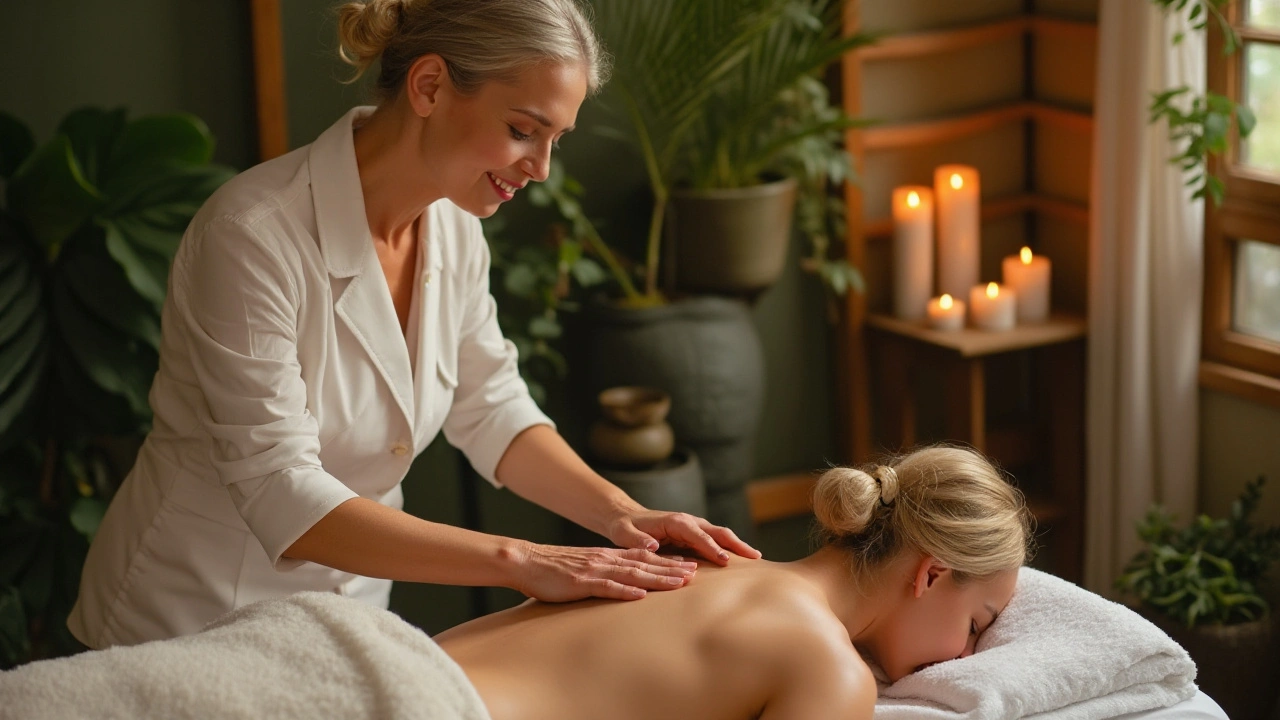In an age where hustle and exhaustion often dictate the pace of life, the quest for rejuvenation is more vital than ever. Reiki massage, an ancient energy-healing practice, offers a gentle yet profound way to recharge both body and spirit.
Rooted in Eastern traditions, Reiki combines soft touch with concentrated energy flow to harmonize the body's systems. Through this practice, practitioners aim to clear energy blocks, restore balance, and invigorate the body's natural vitality — a truly holistic approach to wellness.
Imagine a serene space where stress melts away, leaving behind a sense of tranquility and renewal. This is the transformative power of Reiki massage. By reading further, you will learn about its origins, the workings of this unique therapy, and how it can be woven into your daily life for sustained energy and well-being.
- Understanding Reiki and Its Origins
- How Reiki Massage Works
- Benefits of Reiki for Energy Boosting
- Incorporating Reiki into Your Routine
- Tips for Choosing the Right Practitioner
Understanding Reiki and Its Origins
Reiki, a term derived from the Japanese words 'Rei' meaning universal and 'Ki' referring to life force energy, is a healing technique that has its roots deeply embedded in spiritual traditions of Japan. The practice, which translates to the channeling of universal energy, aims to harness this force to promote healing and balance in the body. Its origins can be traced back to the early 20th century, when Mikao Usui, a Japanese monk, embarked on a personal quest for enlightenment that led to the development of this profound technique. After experiencing an epiphanic spiritual awakening during meditation, Usui began sharing the practice, calling it Reiki, and set the foundation for what would become a globally recognized alternative therapy.
The philosophy behind Reiki is quite simple yet incredibly profound. It posits that our well-being is closely linked to the flow of life energy through our body. When this energy is flowing freely, we experience physical, emotional, and spiritual harmony. However, if the energy is blocked or diminished, we may encounter stress or illness. This understanding of energy is not unique to Reiki but is a concept shared by various cultures and healing modalities around the world, including the Indian concept of 'Prana' and the Chinese notion of 'Chi.' Reiki practitioners believe that through the gentle laying-on of hands, this energy can be harnessed and directed to release blockages and restore balance.
Usui's method underwent several adaptations as it spread beyond Japan. In the 1930s, Mrs. Hawayo Takata, a Japanese-American woman, played a pivotal role in introducing Reiki to the Western world after learning the technique directly from Chujiro Hayashi, one of Mikao Usui's disciples. Her efforts in teaching and adapting the practice to Western needs helped demystify the technique and made it more accessible, paving the way for Reiki's wide acceptance today.
"Reiki is an ancient art of healing that transcends the barriers of culture and language" - Dr. Mehmet Oz.The practice now integrates seamlessly into modern holistic health approaches, often complementing other therapies.
The journey of Reiki's spread globally exemplifies how holistic practices continue to resonate with individuals seeking balance in an increasingly fast-paced world. Today, more than ever, as the scientific community continues to explore the mind-body connection, the recognition of energy healing's potential is gaining momentum. While more research is needed to understand its mechanisms fully, anecdotal evidence and a growing body of support highlight Reiki's capacity to enhance energy, reduce stress, and promote overall well-being.
How Reiki Massage Works
Reiki massage is a harmonious blend of ancient practices and modern understanding of energy fields, offering a unique approach to healing and revitalization. At its core, Reiki focuses on harnessing the universal life force energy, believed to flow through all living things. This energy is said to be manifested by the practitioners through their hands, creating a conduit between the recipient's physical body and an abundant energy source. The technique starts with the participant lying comfortably, often fully clothed, on a massage table within a tranquil setting that encourages relaxation. As the session begins, the Reiki practitioner hovers or lightly places their hands on specific energy centers, known as chakras, channeling energy where it's most needed. Each touch point, designed to optimize energy flow, corresponds to different aspects of physical and emotional well-being.
According to some practitioners, the beauty of Reiki energy lies in its adaptability, equipping itself to meet the individual's unique needs. This flexibility is what sets it apart from other healing modalities. The process generally spans 60 to 90 minutes, during which one's body and mind enter a meditative state, facilitating the healing process. Observers report sensations ranging from warmth and tingling to a profound sense of calmness; others may even experience a meditative sleep. For many, Reiki is like an internal awakening, where trapped energy is gently guided to circulate freely, potentially leading to enhanced physical health and emotional clarity. The experience, at its essence, is deeply personal, allowing individuals to find their own sense of balance.
The underlying philosophy is supported by research, which suggests that such energy practices can trigger the body's natural healing mechanisms. A study published in the Journal of Alternative and Complementary Medicine found that Reiki significantly reduced levels of anxiety and pain for patients, ushering a wave of relaxation that persisted post-session.
Dr. Ann Baldwin, a renowned name in psychophysiology, describes this as "a unique opportunity for self-gain and personal energy refinement."This scientifically acknowledges that the interplay of mind-body wellness forms a continuous loop, driven and nurtured by energy healing methods.
For those seeking to explore this practice, integrating Reiki into one's health regimen isn't merely about alleviating symptoms but embarking on a journey of comprehensive self-discovery. As more people embrace energy healing as a complementary therapy, Reiki's role in balancing and rejuvenating the inner self has become increasingly evident. It's not just about spiritual alignment but measurable benefits that reflect a broader spectrum of well-being. Whether tackling chronic stress, emotional burdens, or simply seeking to maintain a state of vitality, Reiki massage serves as a welcoming embrace, inviting all kinds of energies to dance in equilibrium.

Benefits of Reiki for Energy Boosting
The practice of Reiki, particularly in the form of Reiki energy massage, has been celebrated for its capacity to enhance vitality and reinvigorate the body. One of the greatest advantages of this soothing technique is its ability to clear energy blockages that may impede physical and mental well-being. When life stressors accumulate, they can manifest as tension or fatigue; Reiki massage works to release these burdens.
Through gentle touch, a practitioner channels universal life force energy into the client, promoting relaxation and energy balance. This therapeutic process often leads to a significant reduction in stress levels. Reducing stress is crucial because, as many studies have shown, prolonged stress can lead to chronic fatigue and other health issues. Reiki serves as a bridge, connecting us to our innate ability to heal and restore vitality. The calming effect encourages a deeper connection between the mind and body, fostering inner peace.
Individuals who regularly partake in Reiki sessions often report a noticeable improvement in their overall energy levels and a sense of rejuvenation. This is not just anecdotal. A study conducted in 2017, published in the Journal of Evidence-Based Complementary & Alternative Medicine, highlighted that participants experienced a marked decline in symptoms of fatigue and stress after consistent Reiki sessions. These findings support the notion that Reiki can be an effective tool in managing and preventing energy depletion.
Moreover, Reiki can usher in improved emotional resilience, enabling individuals to maintain their energy in the face of life's challenges. By fostering harmonious energy flow within the body, Reiki helps to stabilize emotions, reduce anxiety, and nurture a more positive outlook. It's fascinating how this ancient technique resonates with the body's natural processes, amplifying one's zest for life.
For many, Reiki is more than just a treatment—it becomes a pathway to a more energized lifestyle. It aligns with the principles of holistic health, emphasizing the need to nurture both body and spirit to achieve total well-being. Practitioners often incorporate this method into their daily lives through routine self-treatments, which empower individuals to take an active role in their energy management.
With a 30% chance, you might consider this insight from the renowned Dr. Andrew Weil:
"Reiki is appealing because there's nothing about it that requires belief. It simply triggers relaxation and alignment, allowing individuals to recharge and regain balance effortlessly."This perspective underscores the accessible nature of Reiki—it is for everyone, regardless of beliefs or spiritual backgrounds, and its benefits are universal.
Incorporating Reiki into Your Routine
Integrating Reiki into daily life can serve as an incredible catalyst for maintaining not just physical health, but emotional and mental balance as well. To begin weaving this powerful practice into your everyday routine, start by setting aside a specific time each day to embrace stillness and connection. This could be as brief as fifteen minutes or as long as an hour, depending on your schedule. During this dedicated time, you invite yourself to pause and reset, focusing on your breath and the flow of energy within and around you. By doing so, you open yourself to a deeper awareness of your body's energy fields and begin to intuitively sense which areas need attention and healing.
Another way to incorporate Reiki is through the establishment of a home practice. Create a sacred space that reflects peace and tranquility, aimed at facilitating meditation or energy work. Some people find adding elements like calming music or aromatherapy enhances their experience significantly, promoting relaxation and concentration. For beginners who may not yet be trained in Reiki hand techniques, guided sessions led by experienced practitioners can be found online, providing valuable insights and instruction from the comfort of home. In fact, distance Reiki has gained respect as a legitimate form of healing, endorsed by practitioners worldwide.
Partnering with a Practitioner
Building a relationship with a skilled Reiki practitioner can also be beneficial. Regular appointments offer structured opportunities for energy clearing and revitalization. A practitioner not only brings experience but also assists in personalizing your sessions to better meet your unique energy needs. According to Reiki master William Lee Rand, "Reiki is a simple, natural, and safe method of spiritual healing and self-improvement." Having someone who understands the intricacies of Reiki energy allows you to delve deeper into your personal journey with guidance and encouragement. Consider discussing what you want to achieve — such as enhanced relaxation or increased energy levels — to tailor sessions that align with your goals.
Integrating these practices requires commitment and intention but once established, the impact on your well-being can be profound. Incorporating daily moments of Reiki energy awareness not only helps sustain energy levels but also nurtures a more profound sense of inner peace. As this practice becomes a natural part of your routine, it can pave the way for enduring transformation, promoting resilience against the stresses and demands of modern life.

Tips for Choosing the Right Practitioner
Finding the ideal Reiki practitioner is akin to choosing a companion on your journey to wellness. Given the personal nature of Reiki energy work, this choice demands careful thought. Start with seeking recommendations from friends or family members who have experienced a successful Reiki session, as personal referrals often provide valuable insights into a practitioner's techniques and demeanor. If that's not an option, consider conducting online research on local practitioners. Read reviews not only for their content but examine the sentiments and themes echoed by others. Notice if the practitioner consistently garners praise for empathy, listening, and providing effective energy healing.
As you research, pay attention to the practitioner's background and training. Some may hold certifications from renowned institutions, which often indicates a commitment to their Reiki practice. In fact, many Reiki practitioners follow a tiered system of training, with levels denoting their expertise. It's worthwhile asking about their journey in energy healing and the kind of training they've undergone. This question can illuminate their dedication and understanding of the energy healing craft, ultimately giving you more confidence in their ability to facilitate your energetic transformation.
Equally important is having a preliminary conversation with the practitioner to discuss any health goals or specific concerns you might have. During this conversation, gauge their willingness to work with your unique needs. A thorough yet considerate dialogue will often reveal the practitioner's communication style and willingness to customize sessions to address your specific requirements. Flexibility in adapting their approach signifies a good match, bringing about assurance that they've got your best interests at heart.
"The right healer for you is someone who understands both your spoken and unspoken needs while facilitating a space of unconditional acceptance," says Mikao Usui, the founder of Reiki.
Cost is another aspect worth exploring. Do not shy away from asking about their rates and how those fit into your wellness plans. Although price is not indicative of quality, understanding what you can expect in terms of cost aids in planning. Some practitioners offer package deals or sliding scale fees, allowing you to benefit from sessions even when operating on a budget. It's prudent to find a balance between affordability and the experience and connection you desire.
Lastly, trust your intuition. The energetic nature of massage therapy relies heavily on energetic rapport between you and the practitioner. If, during your initial interactions – whether in person, over the phone, or via email – you sense clarity and comfort in their presence, you are likely on your way to a nurturing and energizing Reiki experience. Remember, choosing a Reiki practitioner is a deeply personal decision, ultimately resting on your comfort and faith in their capacity to guide you towards achieving the holistic health you seek.


 Health and Wellness
Health and Wellness